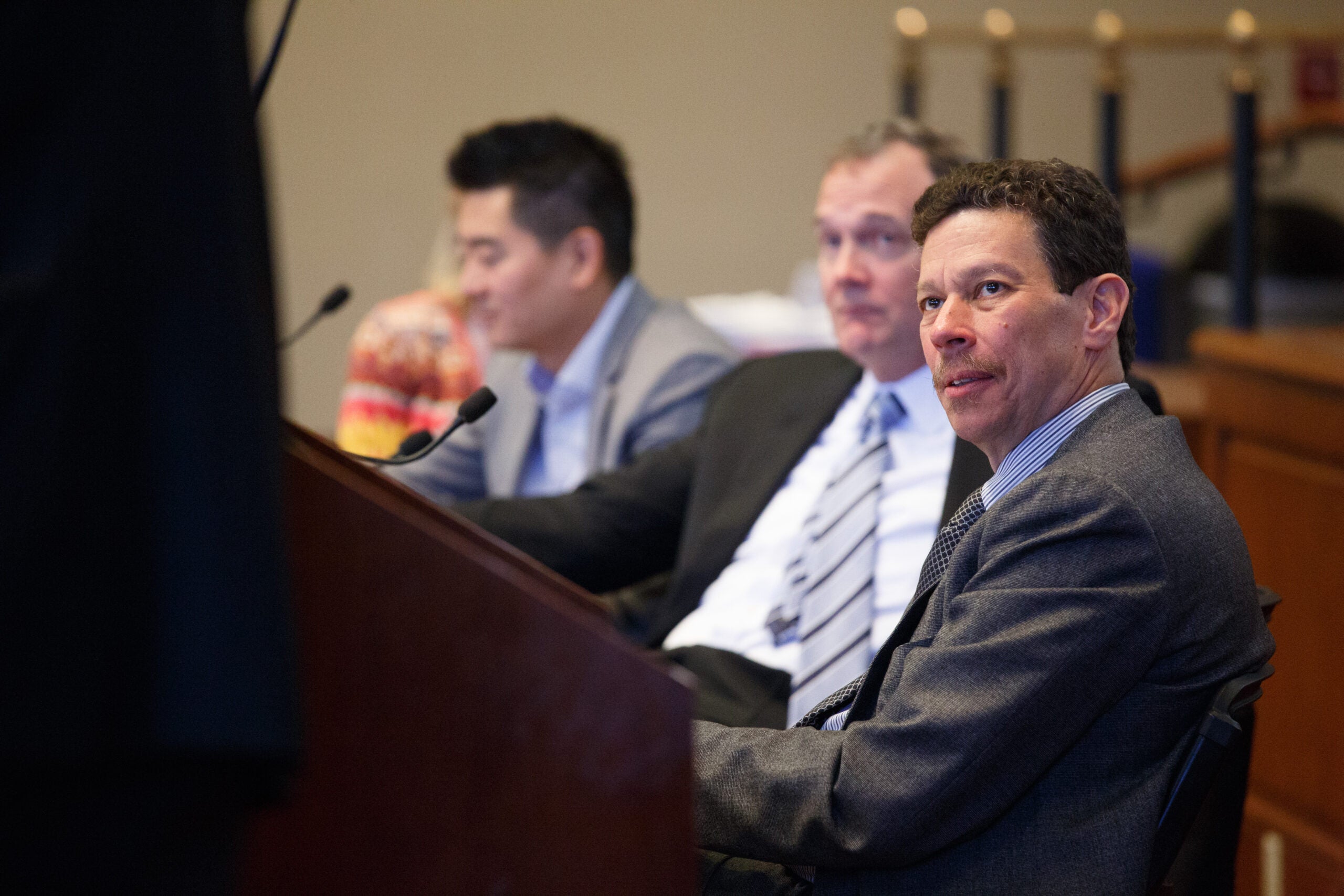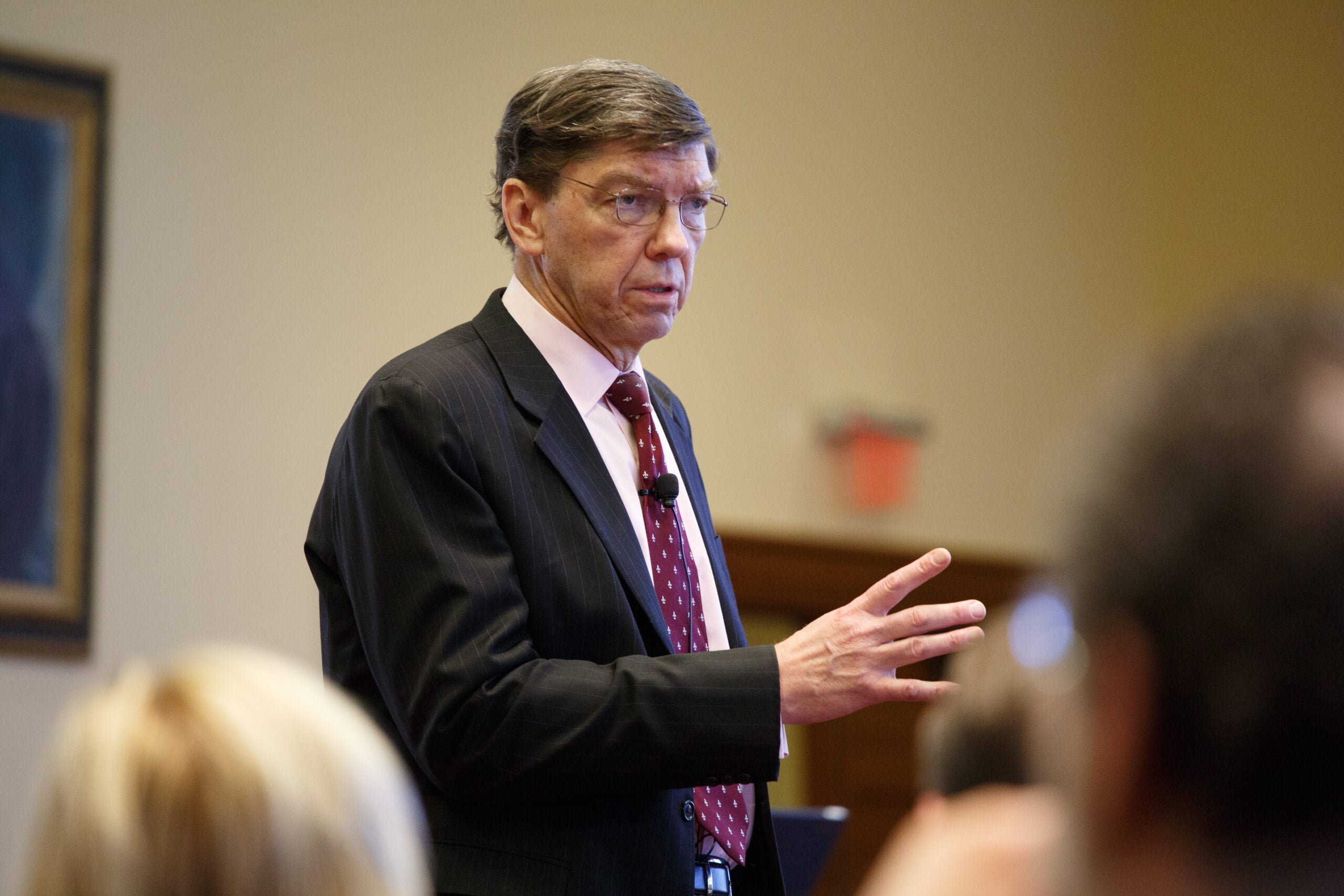When Clayton Christensen, professor at Harvard Business School and best-selling author of “The Innovator’s Dilemma,” coined the term “disruptive innovation,” he wasn’t focusing on the world of law. Rather, the concept refers to products at the bottom of a market moving up to displace established competitors, such as discount retailers disrupting full-service department stores. Yet the field of law is not immune from its own disruptions, as discussed at a recent conference at Harvard Law School titled “Disruptive Innovation in the Market for Legal Services,” sponsored by the school’s Program on the Legal Profession.
In opening remarks, program director Professor David Wilkins ’80 pointed to changes reshaping both the legal profession and the entire economy, including globalization of economic activity, shifts in power to the global East and South, rise in information technology, and the combining of disciplines like law and business. Law was traditionally isolated, local, and resistant to technology. “No one believes that any of these boundaries are nearly as defining as they once were,” he said.
Kicking off the conference, Christensen defined the disruption in the marketplace as involving “innovations that transform products that are complicated and expensive into things that are affordable and accessible.” When these transformations emerge, he said, the traditional principles of good management may not help. He offered the example of Digital Equipment Corporation, which had been successful in manufacturing “minicomputers,” which cost $250,000. DEC believed their customers weren’t interested in personal computers—and a business credo is always ‘listen to your customer,’ he said. Yet innovation at the bottom of the market, the advent of personal computers, ended up destroying the company.
Disruptive innovation occurs, he said, when “there’s a technological core that’s extendable upmarket.” That is why, he said, hotels haven’t faced disruption. Higher education hadn’t been disrupted until the widespread implementation of online learning. In law, there wasn’t a technological core, he added. Now there is.
Watch video of Clayton Christensen’s keynote:
Keynote: Clayton M. Christensen, Kim B. Clark Professor of Business Administration, Harvard Business School; Response: Mike Rhodin, Senior Vice President, IBM Watson Group; Discussants: John Suh, CEO, Legal Zoom; Sarah Reed ’91, General Counsel, Charles River Ventures; Moderator: David B. Wilkins, Lester Kissel Professor of Law and director of Program on the Legal Profession, Harvard Law School
Speaking about a disruption in law, the event’s other keynote speaker, Chris Kenny, the chief executive of the UK Legal Services Board, discussed the infusion of alternative business structures. These law firms in the United Kingdom, which non-lawyers manage or have an ownership interest in, have arisen at a time when one in three consumers don’t get the legal help they need at a price they can afford, and four out of five business consumers don’t get the legal advice they need when they have a problem, according to Kenny.
“The case for some kind of supply-side reform to ensure that social and economic need is met is actually pretty overwhelming,” he said. In addition, there’s no evidence that ethical standards have been lowered or that customer service has suffered, he added. Deregulation needs to happen because unmet need for legal services is still great, he concluded.
Keynote: Chris Kenny, Chief Executive, UK Legal Services Board; Response: William Hubbard, president-elect, American Bar Association; senior partner, Nelson Mullins; Discussants: Ian Tod, Chairman, Deloitte Legal Christina Blacklaws, Director of Policy, Cooperative Legal Services; and Andrew Finkelstein, Managing Partner, Jacoby and Meyers; Moderator: Vikramaditya Khanna, William C. Cook Professor of Law, University of Michigan School of Law
Other speakers at the conference included William Hubbard, president-elect of the American Bar Association; Richard Susskind, author of “Tomorrow’s Lawyers”; Mike Rhodin, senior vice president, IBM Watson Group; John Suh, CEO of Legal Zoom; and Sarah Reed ‘91, general counsel of Charles River Ventures.
Watch video of The Effects on Clients, Technology, Education, and the Profession:
Speakers: Paul Dacier, EVP and General Counsel, EMC Corporation; Thomas Sager, SVP and General Counsel, DuPont Company; Richard Susskind OBE, Professor, Oxford University (via video link) and Martha Minow, Morgan and Helen Chu Dean and Professor of Law, Harvard Law School; Member, Legal Services Corporation; Moderator: David B. Wilkins, Lester Kissel Professor of Law and Director of Program on the Legal Profession, Harvard Law School
After presentations, the conference broke into working groups considering topics such as innovations in access to legal services, legal analytics, and lawyers and technology.
Watch Reports and Responses from Working Groups:
Wilkins on disruptive innovation: ‘There is tremendous interest in this set of issues’

The HLS Program on the Legal Profession’s recent conference “Disruptive Innovation in the Market for Legal Services” drew overflow crowds and created a buzz of activity in the Twittersphere (#PLP_Disrupt). We asked PLP’s director, Professor David Wilkins ’80 to summarize a few of the most surprising takeaways:
“The first thing was just the intense interest among a wide range of constituents. So, for example, we had just announced the conference online, and right away we had 200 people sign up. Some people flew in from Brazil, some from Europe, some people flew in from Asia. We had general counsels from major companies we had venture capitalists, coming not to speak—just to listen. In fact, some of the speakers on the program were people who initially just signed up to come to the conference. There’s just tremendous interest in this set of issues.
“Second, I was struck by just how many startups there are looking at trying to bring innovation in the law, and legal practice. I think we had 20 different startups from around the world presenting, and we heard about many more than that.
“The third thing was just how difficult the task still is going to be of bringing innovation to law. Just how conservative law as a profession is, for some good reasons, and some not so good reasons. How some of the things that have driven innovation in other fields might be more difficult to replicate here.
“So it was both a conference in which there was a tremendous amount of information about what was going on, but also a lot of discussion about where some of the resistance is, or obstacles to change are coming from, and how to think about that.”
